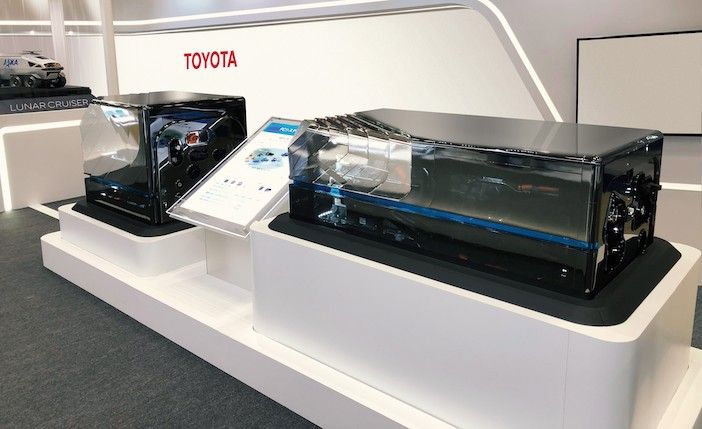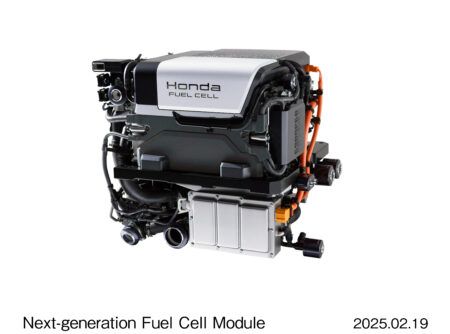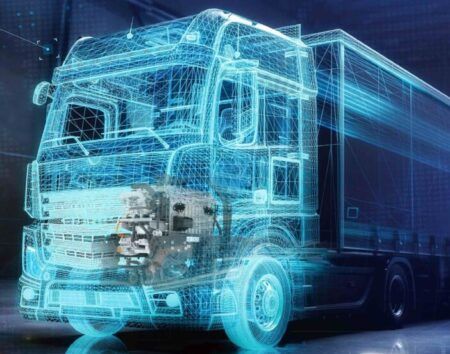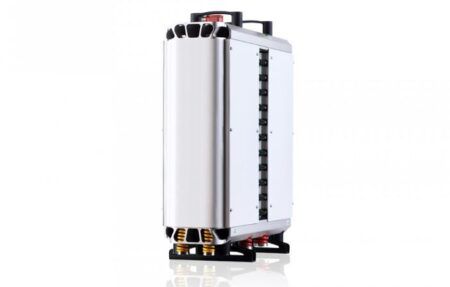Toyota is supporting a project investigating the possibility of using hydrogen as a zero-emission fuel for rail travel. Through its membership of the European Fuel Cell Hybrid Power Pack for Rail Applications (FCH2RAIL) consortium, it is supplying its new hydrogen fuel cell module for use in a prototype train.
The company is working with consortium partners from Belgium, Germany, Spain and Portugal to develop the prototype. At the heart of the project is a hybrid, bi-modal drive system that combines the electrical power supply from an overhead line with a fuel cell hybrid power pack (consisting of hydrogen fuel cells and batteries) that works independently of the overhead line. If successful, it could prove a valuable alternative to the diesel-powered trains still in service across Europe.
The FCH2RAIL project was launched in January 2021 and has already defined operating scenarios and the reference routes for the prototype.
Overhead line and hybrid system: bi-modal, emission-free travelling
The prototype train will draw electricity from overhead lines where they are present, but on stretches of line with no power supply, the energy will come from the on-board fuel cell and battery system – the fuel cell hybrid power pack.
“We want to show that this type of bi-modal train is a competitive and environmentally friendly alternative to the diesel train,” said Holger Dittus, project leader and researcher from the German Aerospace Centre – Institute of Vehicle Concepts (DLR).
Today, many European railway lines are created with overhead lines, which are very expensive, long-term projects that have to address local geographical conditions. An alternative is to introduce purely battery-powered trains, but these have a limited range (30 to 70 kilometres), depending on the route profile and outside temperatures. Current diesel trains have lower performance in terms of top speed and acceleration compared to those using electric motors powered from overhead lines.
“Our bi-modal hybrid fuel cell battery system combines the advantages of both technologies: energy coming from the overhead lines, or from on board. This lets us make rail transport even more sustainable and energy-efficient,” said Sergio Gascon, Technical Project Manager at Construcciones y Auxiliar de Ferrocarriles (CAF), summarising the project’s main goal.
The energy supply system is to be designed so that power and range can be expanded based on a modular principle: the number of fuel cell and battery modules influences the drive power and the number of hydrogen tanks determines the operating range on non-electrified lines. The drive unit can therefore be designed for use in both passenger and freight transport.
With a budget of €14 million, the project aims to develop, demonstrate and obtain approval for this type of system within the next four years. It is part-funded with €10 million from the Fuel Cells and Hydrogen 2 Joint Undertaking (FCH 2 JU).
Bart Biebuyck, Executive Director of FCH 2 JU commented: “Our study on hydrogen and fuel cells showed that there is significant potential for FCH technologies in the rail environment and that hydrogen-fuelled trains will be an important part of building a sustainable European transport system.”
Functional tests with converted commuter train
To understand the full lifecycle environmental impact of such a system and to evaluate its performance under real-world conditions, the project includes plans to convert a CIVIA electric commuter train (manufactured by the Spanish manufacturer CAF and provided by Renfe, the Spanish state railway operator) with an integrated fuel cell hybrid power pack.
One of the central components of the on-board energy system is the packaged fuel cell system module from Toyota Motor Europe (TME), while the batteries and power converters will be provided by CAF. Initial functional tests and trial runs for approval will take place on Spanish and Portuguese tracks with the support of the infrastructure managers Administrador de Infrastructuras Ferroviarias (ADIF) and Infraestruturas de Portugal (IP). The Spanish hydrogen research centre Centro National de Hidrogeno (CNH2) has been entrusted with the construction of a hydrogen fuelling station to refuel the prototype and in FCHPP testing before train integration.
Thiebault Paquet, Director of the Fuel Cell Business Group at Toyota Motor Europe said: “We embrace this opportunity of working within the consortium to bring our fuel cell technology to another type of hydrogen application. Hydrogen has an important role to play in helping decarbonise Europe’s railways, and we are excited to integrate Toyota fuel cell modules into the Fuel Cell Hybrid Power Pack.”
Designing and controlling the system, energy management and homologation
The international project team still has a number of technological challenges to solve before the first trial runs can take place: in design terms, the fuel cell and battery modules must be combined and controlled in such a way that the system meets all requirements and can be implemented cost-effectively. In addition, it should be possible to use the waste heat from the fuel cell modules in an efficient way to heat and air-condition the train. As part of the project, the air conditioning manufacturer Faiveley/Stemmann Technik (STT) and DLR are investigating innovative solutions to reduce the energy demand for heating, ventilation and air conditioning.
The project is also examining norms and standards in the fields of hydrogen and rail transport and attempts to bring the two together, assuring safe interaction between the hydrogen technology and overhead catenary (system of overhead wires) at all times. Based on this, the project team is developing proposals for EU authorities to ease the approval process for these trains in the near future.





